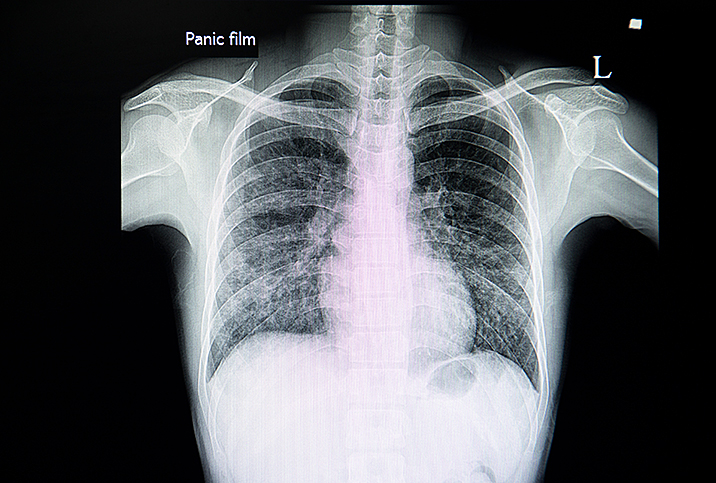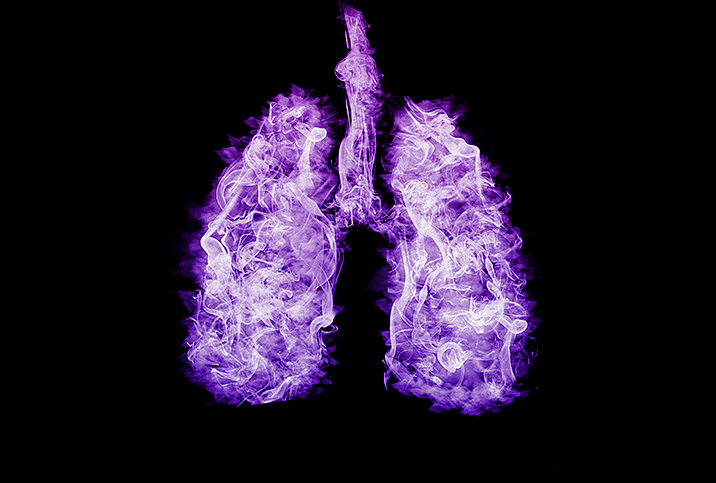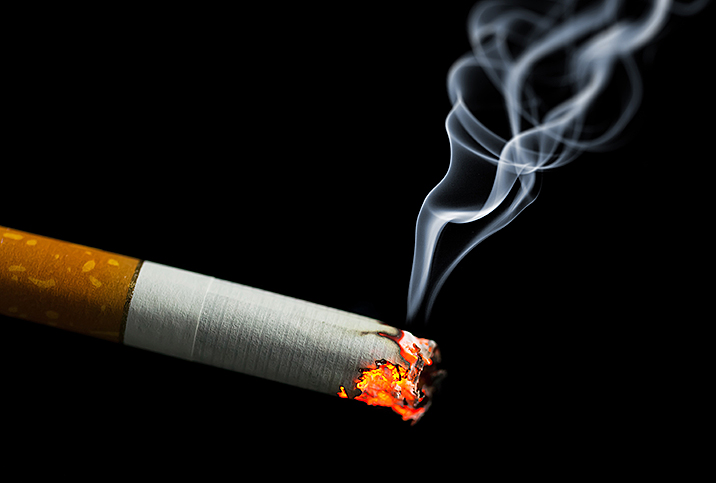Lung Damage Poses Risks to Your Sexual Health

If someone were to ask you what the cause of lung damage is, you might reply smoking cigarettes. Or, perhaps based on our collective experience over the past few years, COVID-19 could serve as a proper answer, too.
While these responses are definitely on target, other unlikely risk factors can also cause significant lung damage. Keep an eye out for them, not just for the quality of your breathing but also the quality of your sex life.
Lung damage and your sex life
Any kind of sexual activity—including masturbation, oral sex and intercourse—requires energy. You use your heart and muscles, and you need to breathe more rapidly. The energy you need is no more than when you take a brisk walk or climb stairs, but nevertheless, if you have lung damage, you run the risk of breathlessness, becoming excessively tired or exacerbating other symptoms.
If lung disease, such as chronic obstructive pulmonary disease (COPD) or asthma, hinders respiratory function, people can experience shortness of breath while engaging in sexual acts.
"Obviously, a person's sex life requires the ability to breathe adequately," said Ken Perry, M.D., an emergency physician in Charleston, South Carolina. "This can certainly limit performance and duration of exertion."
In particular, when a man's respiratory system is weak due to lung diseases like COPD, it can hinder blood flow, which leads to limited blood flow to the penis, potentially causing erectile dysfunction (ED).
"Chronic illnesses such as COPD can cause erectile dysfunction because people with COPD can have lower levels of blood oxygen," said Abbas Kanani, M.R.Pharm.S., the superintendent pharmacist at Chemist Click, an online pharmacy in the United Kingdom. "Conditions that affect blood flow to the penis can cause impaired erectile function."
What is lung damage?
Lung damage, known as lung disease, is any health condition hindering your lungs' ability to function properly.
"The pulmonary system can be damaged either by direct damage to the lungs themselves or even from a problem with the blood supply to the lungs which makes it difficult to oxygenate blood," Perry explained. "When the lungs are damaged, they can affect respiratory function, reduce breathing capacity and limit blood production."
There are three types of lung disease:
- Airway disease. This disrupts the tubes carrying oxygen and other gasses in and out of the lungs.
- Lung circulation diseases. These affect the blood vessels in the lungs leading to and from the lungs. Lung circulation diseases are caused by clotting, inflammation or scarring.
- Lung tissue disease. Also known as pulmonary fibrosis, this disease occurs when lung tissue is damaged and scarred.
The three categories of lung disease are further broken down into the following respiratory conditions:
- Asthma
- COPD
- Collapsed lungs
- Cystic fibrosis
- Lung cancer
- Lung infection (pneumonia)
- Pulmonary edema
- Pulmonary embolism
Symptoms of lung damage
Symptoms that may be early signs of lung damage include:
- Chronic cough
- Coughing up blood
- Fatigue
- Increase in mucus production
- Pain or tightness in the chest
- Shortness of breath
Risk factors for lung damage
Common risk factors for lung damage or disease are bacterial, viral and fungal infections. In addition to infections, lung damage can arise from exposure to environmental factors, such as smoking or radiation.
Additional environmental risk factors that can cause lung damage include:
- Air pollution
- Asbestos
- Certain organic chemicals
- Environmental tobacco smoke
- Hazardous chemicals such as arsenic, cadmium, nickel and uranium
- Pesticides
- Radon
- Tuberculosis
Uncommon causes of lung damage
Chemical exposure is a leading cause of damage to the lungs. While public health campaigns warn people about cigarette smoking and secondhand smoke, as well as toxic chemicals in specific work environments, there are other lesser-known causes, too.
Here are six sources of lung damage that may not immediately come to mind:
Flour
Flour is ubiquitously found in home kitchens, restaurants and bakeries. Unfortunately, flour is known to cause "baker's asthma," which occurs when the particles within the powder are inhaled.
"It can worsen lung conditions like asthma and cause long-term damage to your lungs when exposed to high volumes," Kanani explained.
Car airbags
When an airbag deploys in the vehicle, the accompanying dust from the small explosion required to activate the airbag can quickly cause breathing problems. For some people, the airbags may trigger an asthma attack.
In addition, airbag pneumonitis, a rare chronic disease, can develop when airbags deploy. Airbag pneumonitis, which occurs after inhaling the aerosolized chemicals from the airbags, manifests as shortness of breath, persistent cough and mucus production.
Alpha-1 antitrypsin deficiency
Alpha-1 antitrypsin deficiency (AATD) is a genetic disease increasing the risk of developing chronic conditions affecting the liver, skin, blood vessels and lungs. Adults diagnosed with AATD are likely to experience lung issues such as shortness of breath, wheezing and fatigue. In addition, if a patient with AATD develops COPD, it's commonly expected to progress into emphysema, which occurs when the air sacs in the lungs are damaged.
Birds
Birds carry the disease bird fancier's lung (BFL), a form of hypersensitivity pneumonitis.
Hypersensitivity pneumonitis occurs when a person inhales an allergen. Patients develop BFL after exposure to bird droppings and wax proteins in their feathers. Early detection and treatment can prevent its progression to chronic BFL, which could lead to heart failure.
Fireworks
Shooting off fireworks is popular during holidays, especially Independence Day and New Year's Eve. Most events are public and planned so the audience sees the fireworks in the sky but is not in range of the smoky fumes from the initial flight. If you plan to attend a private party, you should be aware that fireworks release chemicals posing risks to a person's respiratory system.
Fireworks often contain toxic metals such as lead and copper that can increase oxidation when inhaled. Oxidation damages or kills healthy cells in the body, which can contribute to lung damage.
Humidifiers
Humidifiers are designed to purify household air, but over time, they can create fungi and release them into the air.
"Fungus can grow in a humidifier and blow into the air and enter the lungs," Kanani explained. "This can lead to an allergy to the lungs developing and becoming inflamed."
Treatment
Patients with lung damage can expect a lengthy recovery period to return to normal health. However, each type of lung damage has different levels of severity, and only a physician can determine the length of recovery for each patient.
Some examples of standard treatment options for lung damage are:
- Chemotherapy
- Clinical trials
- Immunotherapy
- Inhalers
- Lifestyle changes such as eliminating smoking, avoiding exposure to secondhand smoke and getting vaccinations
- Lung transplant
- Lung volume reduction surgery
- Medications
- Oxygen therapy
- Pulmonary rehabilitation
Coping with breathless sex
If shortness of breath is holding back your sexual activity, talk to your healthcare provider. In the meantime, certain strategies can make your sex life more comfortable and pleasurable:
- Communication. Have a conversation with your partner before the action starts. When you're honest about your condition, it's easier for both of you to relax and agree on some simple ways to avoid exacerbating your symptoms.
- Medications. If you use an inhaler from time to time, keep it within easy reach.
- Physical activity. Taking a regular walk or doing some simple exercises is good preparation for the energy you need for sex.
- Sex positions. There are less physically demanding ways to be intimate with your partner than full-on penetrative sex in energetic and imaginative positions. Explore positions that don't put pressure on your chest, and have your partner take on more of the work.
- Time and place. Schedule a time for sex when you're feeling at your best. Pick a place that's comfortable, avoiding any areas that are dusty, smoky or laden with heavy fragrance. Also, it's best not to indulge in a large meal or alcohol beforehand.
If you need to slow things down and take a quick breather, make it part of your routine so it doesn't ruin the mood. Kissing, hugging and touching are simple yet effective ways you can experience intimacy without exerting yourself.


















